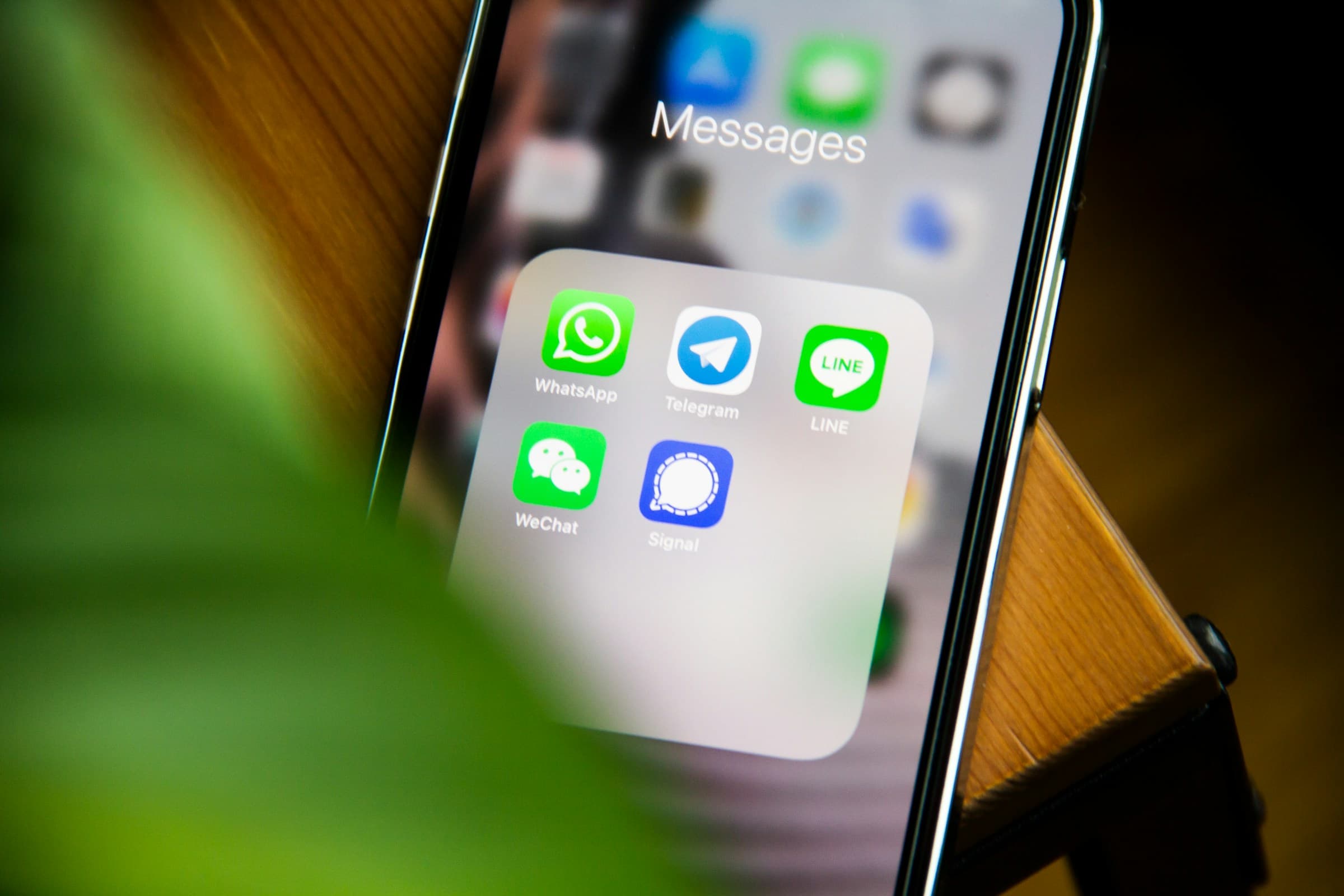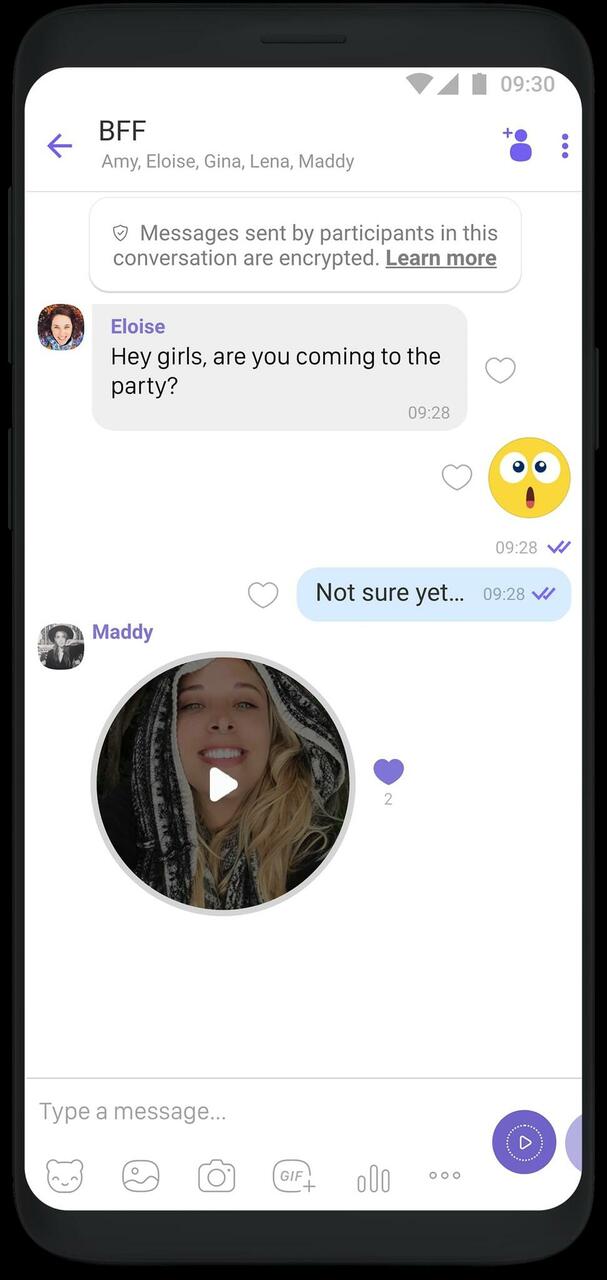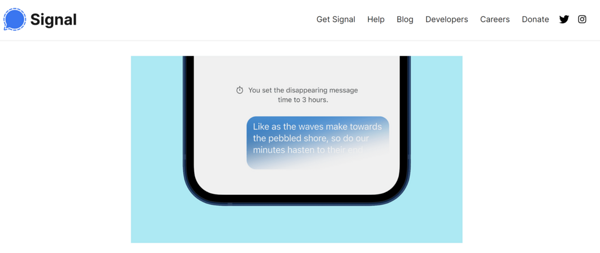Messaging apps have transformed how we interact with friends, family and colleagues, allowing us to converse instantly and conveniently. We can have rapid back-and-forth exchanges without actually speaking on the phone – or just respond to messages at our leisure. But, for all the advantages chat apps bring, some offer a pretty big downside - a lack of robust security features.
Messente's anti-fraud specialist, Karl Kalvik, explains why data security matters for both individuals and businesses using such apps: "If you use a messaging app that doesn't have the proper security protocols in place, you'll risk your message content being seen by third parties instead of only the intended recipient. That could be the messaging provider or worse, a hacker spying on your activities. The consequences of sensitive or confidential information getting into the wrong hands could be extremely harmful to the sender and recipient, whether it's friends messaging each other or a business connecting with its customers. These can include identity theft and financial scams - and in the case of businesses - reputational damage and hefty fines from regulatory bodies."
Using a secure messaging app can significantly reduce the chances of such threats (although not entirely, as unfortunately, no messaging app is 100% safe). This article presents some of the top apps that offer high security at their core.
Defining secure messaging apps
First, though, let's explore what makes a messaging app secure. Solid user verification processes are a must, of course, to ensure that only genuine users are logged in. At a minimum, the messaging app should support two-factor authentication (2FA), where users confirm their identity, usually by entering both a password and a time-sensitive unique PIN code.
Double-checking user identity is just one benefit of 2FA. It also helps app users keep account security front of mind. For example, if an unauthorised person attempts to log into an app after hacking the account password, the rightful user is immediately informed (as they'll receive a notification with the second set of login credentials).
Here are some other essential features of secure chat apps:
Strong encryption standards and protocols - such as end-to-end encryption (E2EE). Once enabled, no one, not even the messaging platform, can read your message contents as they travel from your device to the recipient's.
Perfect forward secrecy - an advanced encryption system whereby each piece of data is encrypted using a unique key. Even if one key is breached, the other keys protecting other pieces of data remain secure.
Chat locking - the option to hide chats behind a passcode or pin, similar to the protection on your device's lock screen.
Message edit or 'unsend' option - sometimes you might want to retract a message, for example, if you send it to the wrong person or if you've made a mistake in the content.
Disappearing messages - which automatically delete themselves after a certain period of time.
Legal compliance - the app should comply with data protection regulations and have a clear privacy policy that describes how it uses your data.
Source code availability - open source messaging apps are transparent about how data is processed and allow for external cybersecurity experts to test features to identify vulnerabilities.
Nine of the best encrypted messaging apps for individuals and businesses
You'll see some big names in this roundup - and some lesser-known ones too. We explore the key security features of each to help you figure out the one that most suits your needs.
1. Viber
Viber lets people make free calls and send messages to anyone, anywhere in the world. It also offers a commercial solution - Viber Business Messages - to help companies connect with customers through conversational, transactional and marketing notifications, bulk messaging, automated responses, chatbots, targeted ads, branded stickers and more.
Viber's security features:
Default end-to-end encryption - users don't need to toggle this option on; it's already in place for text messages and voice and video calls. Both private and group messages are safe from prying eyes and ears.
2-step verification – you can set up a PIN to use when activating a new phone or making changes to your account.
Access control - across all group chats, channels and communities, with 'Superadmin' and 'Admin' permission levels.
Disappearing messages – all sides of the conversation can be automatically deleted according to a self-destruct timer you set.
Edit and delete messages option - letting you control what you share.
Hidden-number chats – no need to exchange or display phone numbers when meeting new people in a community.
Hidden chats – set a PIN to hide specific chats from your chat list.
Online status tools – control when others can see you online.
2. Telegram
Telegram is a fast, straightforward and free messaging app with more than 700 million monthly users. It's one of the ten most downloaded apps in the world, suitable for everyone, including small businesses that want to take advantage of its large groups, file-sharing options, usernames and desktop app.
Telegram's security features:
MTProto protocol – a strong end-to-end encryption protocol designed by Telegram. It consists of three independent parts and is faster and more efficient than HTTPS.
Secret chats – these are end-to-end encrypted, can self-destruct and can't be forwarded to anyone. They're not stored on Telegram's cloud, only on the devices of origin.
Open source code – so the app can be fully tested by security experts to see how the app works.
Bug-bounty programme – anyone who claims Telegram messages can be deciphered is invited to prove it, with a chance to win $300,000.
2-step verification for user logins.
Hidden phone number option – in private chat and group messages. Your phone number is only visible to people you've added as a contact.
GDPR compliant – Telegram only keeps the necessary data required to function as a messaging service.
Note: Telegram's end-to-end encryption isn't available for regular private and group messages, only secret chats. Also, because Telegram uses its own proprietary encryption protocol, it's not as widely tested as others, such as the Signal protocol.
3. Google Messages
Google Messages is a text messaging app designed for Android devices. It offers both RCS and SMS and comes pre-installed on new Android smartphones today. Essentially, the app rivals Apple's iMessage, offering users a flexible, rich instant messaging service with the ability to easily share photos and files, set up group chats and see read receipts and typing indicators.
Google Message's security features:
Transport Layer Security (TLS) end-to-end encryption - for one-to-one messages and group chats as long as the recipient also uses RCS chats.
Two-factor authentication - Google encourages a secondary verification step to help protect your account.
Verified SMS - to help individuals trust the identity of businesses they're texting with.
Spam detection tools - Google's algorithms are pretty good at identifying spam messages and hiding them in your spam folder.
Data protection - Google doesn't share or send message content anywhere unless you report messages as spam. In that case, Google only uses and stores data that doesn't personally identify you.
User permissions - you can control who messages you by blocking or reporting people who send unwanted texts.
Compliance - Google holds several security certifications. including:
ISO/IEC 27001 (Information Security Management)
ISO/IEC 27017 (Cloud Security)
ISO/IEC 27018 (Cloud Privacy)
ISO/IEC 27701 (Privacy Information Management)
SSAE18/ISAE 3402 (SOC 2/3)
Note: currently, if you use Google Messages to text an iPhone user, the content won't be encrypted. However, Apple is set to support RCS sometime in 2024, so in theory, that issue will soon be resolved.
4. WhatsApp
WhatsApp is a leader in the messaging app market, with around 2 billion monthly active users worldwide. Usage is particularly strong outside of the United States. WhatsApp's popularity is partly due to it being one of the first apps to offer instant messaging and calling over WiFi, enabling users to share media files and make international calls for free. Today, businesses can also use WhatsApp to deliver personalised customer experiences via conversational messaging.
WhatsApp's security benefits:
End-to-end encryption - on all text messages, voice and video calls, including one-to-one and group chats.
Chat lock - enable this function to protect specific conversations. They're then stored in a separate 'Locked Chats' folder. Chats can be unlocked through device authentication (fingerprint or facial ID) or a preset passcode.
Self-destructing messages - set messages to disappear after 24 hours, seven days or 90 days.
Silence unknown callers - a way to weed out spam and unknown contacts.
Encrypted backups - extend the security of messages saved in Google Drive or iCloud.
Online privacy settings - choose who can see when you're online and when you last used the app.
Automatic spam detection - WhatsApp catches most spam or scam accounts before they reach you.
Proactive security alerts - you'll be prompted to verify your identity if WhatsApp suspects unauthorised account access.
Two-step verification - set up a secret PIN to add more security to your account.
Bulk messaging not allowed - businesses can’t send blanket messages to contacts because Whatsapp wants to protect its primary users (individuals) from what could be construed as spam. Businesses can only send pre-approved automated responses within 24 hours of a customer initiating a conversation.
Restricts political and government use - to keep users safe.
5. Signal
With around 40 million monthly users, Signal is a powerful, simple and secure instant messaging and calling app with a core focus on user privacy. The company behind it is an independent nonprofit with no ties to any major tech companies. The development of Signal is supported by grants and donations.
Signal's security features:
End-to-end encryption by default - based on the open-source Signal protocol, which is the gold standard for private messaging and is already trusted by WhatsApp and Google to protect billions of conversations.
Everything’s encrypted – messages, calls and even sticker packs.
Safety numbers - each one-to-one chat has a unique safety number, allowing users to verify that messages and calls with specific contacts are secure and genuine.
Complete source code available - including for the Signal clients and Signal server.
No ads or trackers - so you won't be presented with marketing based on your online behaviours.
Signal PIN - a code (unrelated to your device passcode) you can use to help recover your account if you lose or switch mobile devices. It also serves as a registration lock.
Signal usernames - to enable users to keep their phone numbers private.
Disappearing messages - can choose a custom timeframe up to four weeks.
Note: Signal is a security-oriented messaging app. Encrypted messages aren't an option; they're mandatory. One potential challenge is that you'll get alerted periodically when a contact's safety number has changed, meaning Signal has created a new cryptographic key for the conversation. This can be confusing as you might think your messages are being hacked. However, it's most likely your contact has got a new phone and reinstalled the app.
6. Session
While Signal's strength is security, Session's is anonymity. This messenger app is for people who want absolute privacy and zero surveillance. It lets you send texts, images and voice messages to individuals or groups. Voice and video calls are currently a beta feature.
Session's security features:
No phone number or email required for sign-up – you're simply given a long string of random characters as your Session ID, which can't be used to identify you.
No risk of data breaches – Session doesn't collect data so nothing can be leaked.
Open source code - anyone can audit and contribute; there's nothing to hide.
End-to-end encryption – built on the highly trusted Libsodium cryptographic library.
Onion routing network – a network of nodes for transmitting messages securely. No server receiving a message ever knows the IP address of the sender.
Disappearing messages – where you can set a time for when messages should be permanently deleted.
Recovery phrase – if you need to restore your account onto a new device, you can't do it with a username and password (as no information is stored about your identity). Instead, you'll get a unique, lengthy recovery phrase.
Note: Session is a good option if privacy is your priority. However, the app doesn't support Perfect Forward Secrecy, and it also lacks features in other areas (e.g. voice calls).
7. iMessage
iMessage is Apple's built-in messaging app, which all iOS, iPadOS, Apple Watch and Mac users will be familiar with. It allows users to text, share files and group message others using Apple products over WiFi. iMessage is seen as a feature-rich alternative to traditional SMS/MMS and is very similar to RCS messaging for Android users. (Explore the differences between RCS vs iMessage.)
iMessage's security features:
End-to-end encryption – for all messages sent between Apple devices.
iMessage contact key verification – which helps users verify whether they're communicating with the people they intend.
Apple account authentication – two-factor authentication as standard. Users can also request a physical security key to use when logging into their account.
Disappearing messages – if you don't want messages to remain on your device indefinitely, you can choose to automatically delete them after 30 days or one year.
Advanced data protection – end-to-end encryption for iCloud services, where message backups are stored.
Message edit and unsend option – to change or retract sent messages if needed.
iMessage blocking – easily block unwanted contacts or hide notifications from them.
Note: iMessages currently can't be encrypted when sent to Android devices – a drawback that should be rectified when Apple introduces its support for RCS messaging.
8. LINE
LINE is a 'Super App' used widely in Japan and South East Asia. Users can connect with friends and family via free messages, video and voice calls, anywhere, anytime. LINE is also a hub for entertainment, social media, shopping, banking and more. Through LINE, users can access healthcare services, restaurants, travel agents and even job boards.
LINE's security features:
'Letter Sealing' end-to-end encryption - which applies to private and group texts (with 50 or fewer participants).
Two-factor authentication - to strengthen web-browser logins.
ID search prevention - an option you can toggle to stop other users searching for your LINE ID.
Account blocking, hiding or deleting - LINE gives you three options to control how other users can contact you.
Message 'unsend' option - you can retract a message within 24 hours of sending it.
Hidden chats - choose to hide certain chats from your main chat screen.
Note: LINE collects a fair amount of user data, including device and location information. LINE also uses tracking to collect online behavioural data, which may be shared with third parties for targeted advertising. Both the sender and recipient must also turn on LINE's 'Letter Sealing' for chats to be encrypted.
9. Element
Element is a secure messaging and team collaboration app that lets users control of the content they share and receive. The app enhances productivity and improves security across businesses, governments and their partner ecosystems. As well as messaging, features include video conferencing, file sharing and voice calls.
Element's security features:
End-to-end encryption - fully encrypted messages for safer business communications.
Built on Matrix - an open-source framework for decentralised communication.
Encrypted file sharing - for safe data transmission while managing projects.
Self-hosting allowed - to give you maximum control and ownership of data and messages.
Ad-free - no tracking of online behaviours.
Cross-signed device verification - enabling you to keep track of every device that joins an encrypted conversation.
Open-source project - hosted by GitHub. Cybersecurity experts are invited to report bugs and contribute to Element's development, ensuring transparency, security and integrity.
How to choose the best private messaging app
First, consider what you need a messenger app for. Is it for private use, for texting friends and family? Or for business, to send promotional messaging, transactional notifications or internal communications?
All apps offer different levels of security, so the next step is to figure out the minimum amount of security you're comfortable with.
If you're using a messenger app for business, you must consider your legal obligations regarding customer data protection. You'll need a detailed and accessible privacy policy setting out how you'll collect, store and use data. Also, check whether your preferred app is compatible with your existing systems, e.g., your CRM.
Prevent data security breaches with an encrypted messaging app
Cybersecurity threats are rising, with hackers continually finding new ways to breach a system's defences. Using a secure messaging app is one way to stop sensitive information from getting into the wrong hands.
Secure messaging apps offer robust encryption methods, source code availability and helpful user features like chat hiding, account blocking and self-destructing messages. They're also transparent about compliance and have clear privacy policies in place. The nine apps listed above are some of the most secure messaging apps around, so they’re a good starting point for your research.
Learn more about secure business messaging with these insightful articles from Messente's blog.







